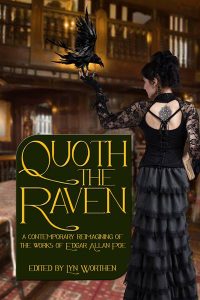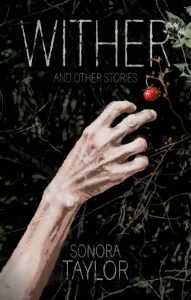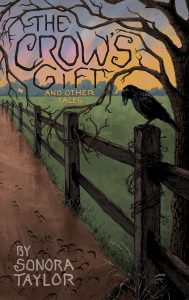You never know who will show up here at the sprawling complex of Poseidon’s Scribe Enterprises. I had the honor of interviewing another author whose story appears in the new anthology Quoth the Raven, a book that just launched today. Let me introduce Sonora Taylor.
 Sonora Taylor has been writing for many years. She is the author of The Crow’s Gift and Other Tales, Wither and Other Stories, and Please Give. She is also the co-author of Wretched Heroes, a graphic novel co-written and illustrated by Doug Puller. Her next novel, Without Condition, will be released in February of 2019. She lives in Arlington, Virginia, with her husband.
Sonora Taylor has been writing for many years. She is the author of The Crow’s Gift and Other Tales, Wither and Other Stories, and Please Give. She is also the co-author of Wretched Heroes, a graphic novel co-written and illustrated by Doug Puller. Her next novel, Without Condition, will be released in February of 2019. She lives in Arlington, Virginia, with her husband.
Now, on to the interview:
Poseidon’s Scribe: When and why did you begin writing fiction?
Sonora Taylor: I’ve been writing fiction since I was a little girl. While I had many interests that didn’t last — ballet, soccer, drawing — writing was one I stuck with, and one that seemed to be a good one to stick with. My teachers always liked my stories, as did my family.
I went through gaps in my writing, especially when I graduated from college and started my career. I went a few years without writing much, but still played out stories in my head. A few ideas settled down and wouldn’t leave, even when all I wrote for them were a few notes.
In 2016, I decided to try writing stories again as a way to relax after work, and also to keep my creative juices going. I was just going to write and see what happened. I ended up finishing one story, “All the Pieces Coming Together.” I started and finished another one, “The Crow’s Gift.” Then another, and another. Then I started what became my first novel, and I’ve been writing daily ever since.
P.S: What other authors influenced your writing?
S.T.: I’m a voracious reader and draw influences from a lot of different writers and styles. My favorite book growing up was Absolutely Normal Chaos by Sharon Creech. I still try to read it once a year. The dry humor, use of dialogue, and unique voice of the protagonist had an influence on my writing for sure, one I recognized more after I started writing and then reread the book again.
The same goes for Bill Amend, who writes and illustrates Foxtrot. I read lots of comics growing up, though not many superhero comics — I mostly read newspaper dailies, slice-of-life indie comics, and Archie. I adored Foxtrot, and the way the humor builds in each line of dialogue from panel to panel is so good. I think my comics fandom helped me develop my skill for writing dialogue.
I’d be remiss to not include Stephen King. I started reading his work when I was 14. One specific story of his really influenced my writing: “The Man Who Loved Flowers.” It’s a story that starts rather innocent, then takes a hard left turn into sinister. I love that style of horror, and such turns are ones I like to incorporate in my writing, both for the chill factor and to challenge myself as a writer to not take the well-beaten path.
P.S: Suppose you just met an interested reader in an elevator. The reader asks, “What sort of stories do you write?” The doors will open soon, so what short answer do you give this reader?
S.T.: I write stories that will unsettle you more than they’ll scare you.
P.S: Although you’ve self-published a novel and two collections of short stories, your inclusion in Quoth the Raven is your first acceptance by an editor. Please describe your feelings and actions upon learning of that acceptance, and convey something of the effort to achieve it.
S.T.: It was a great feeling for sure. While I self-published my short story collections and novel, I’ve also been submitting short stories to journals, anthologies, and contests over the past two years. I did so with the desire to get my work out there, and also so I could grow comfortable with sending my work to strangers to review. I also did so to grow comfortable with rejection. I keep all my rejection letters in a binder.
When I started the rejection binder, I did so with the hope that I’d eventually have an acceptance binder. It felt really good to start one last month, and to christen it with my acceptance letter for Quoth the Raven.
I heard about the anthology through Facebook, and heard about it three weeks before the deadline. As I read the prompt, the wheels started turning and I worked on my story, “Hearts are Just ‘Likes’” (I’ll talk more about the story below). My friend proofread it for me and gave me feedback, which I incorporated; and then I submitted it. All I can do when I submit is wait, and I’m used to a longer waiting period with most of my submissions (though I figured this would be faster given the projected publication date).
When I first got my reply, I thought it was a rejection, since the preview text was “Thank you for your interest …” I’ve read that many times, in both the literary context and when I’ve been job-hunting; so I expected to see the usual reply of how my story wasn’t selected, it was difficult to choose, etc. So, I was quite thrilled when I read, “It gives me great pleasure to accept your story.” I grinned to myself and read it a few times over again. It finally happened — I got an acceptance!
 P.S: In Quoth the Raven, your story is “Hearts are Just ‘Likes’,” a social media spin on Poe’s “The Tell-Tale Heart.” What was your inspiration for writing this story?
P.S: In Quoth the Raven, your story is “Hearts are Just ‘Likes’,” a social media spin on Poe’s “The Tell-Tale Heart.” What was your inspiration for writing this story?
S.T.: When I first read the call for submission, I started thinking of my favorite Poe stories and how those stories could be updated. As I brainstormed, I thought of “The Tell-Tale Heart,” and initially connected the title to the visual hearts on platforms like Instagram and Twitter. The title, “Hearts are Just ‘Likes,’” came next; and I thought of how I could update that story to take place on social media.
The core of the terror in “The Tell-Tale Heart” is the narrator’s fear of being seen, which manifests into him being certain that his guilt is clear to the police in the form of a beating heart and the watchful eye of his victim. Social media thrives on people being seen, but for every good feeling of connection, it also creates a form of paranoia, in that many feel they need to always perform as if they’re always being watched online. I wondered what it would be like for someone whose identity is very much based on being seen online, if they committed an atrocious act offline and had to account for it on social media.
P.S: What are the easiest, and the most difficult, aspects of writing for you?
S.T.: The easiest aspect of writing for me is dialogue. I love to write conversations, especially between two people. It helps me sort out their thoughts and what they’re thinking, and it’s easier for me to work through what I want them to say by having them speak it out as opposed to writing narration. A lot of my first drafts are heavy with dialogue, so much that they resemble a script; and excess lines of dialogue are the first to go when I start revising.
The most difficult aspect is writing past a line or description I’m stuck on or am not getting just right, before moving on to where I want to go next. I’ll stare at my cursor, write, delete, write, delete, and find myself wishing I could just get this one part right because I know what I want to write after it. I’ve had to learn to force myself to write something, or even just a note to add something better later on. It’s gotten better, but it’s still something I get stuck on in every draft.
P.S: Suppose you’ve traveled through time and met yourself at a point when you were first thinking of being a writer. What one thing do you tell this younger version of you?
S.T.: Hi younger me. Wow, you’re sixteen — half my age! I see you’re working on what you think will be your first novel. Keep writing it. You’re taking time away from the Internet and TV to write a book for one or two hours every night. This is excellent discipline, and even if you don’t finish the book — which you won’t, and honestly, that’s for the best — you’re learning how to set aside time to write amidst the hubbub of your chores and your hobbies. This is especially important as you’ll only be on the Internet more in sixteen years.
 P.S: One of your short story collections is Wither and Other Stories. Please talk about the common thread connecting these stories. Also, did you write the stories with the collection in mind, or decide to collect them later?
P.S: One of your short story collections is Wither and Other Stories. Please talk about the common thread connecting these stories. Also, did you write the stories with the collection in mind, or decide to collect them later?
S.T.: The common thread connecting Wither and Other Stories is the choice to partake. In some stories, this is temptation, while in other stories, it’s a choice rooted in survival. Which decision will give the best outcome — and does that decision even matter when it comes to the outcome?
I did not write the stories with the collection in mind (I almost never do). I wrote the four stories — “Wither,” “Nesting,” “Smoke Circles,” and “We Really Shouldn’t” — while I was waiting to receive Please Give (my first novel) back from my editor. I wrote a few other stories as well, but those were the stories I felt were most ready to be in my next collection. I saw a few themes between them — nature, relationships, one’s mental state — but it was my cover artist, Doug Puller, who inspired me to see the common thread. As he suggested artwork for the cover, he mentioned drawing a hand reaching for a wild strawberry, and having it be reminiscent of reaching for forbidden fruit. His words struck a chord with me, and while I don’t consider the stories to contain forbidden fruit, I do think all of them have some element of trying to decide whether or not one should do something that seems forbidden.
 P.S: Your other short story collection is The Crow’s Gift and Other Tales, and these stories, too, have a common element: gifts and the connections they form. Please tell us a bit about the protagonist of the tale involving crows.
P.S: Your other short story collection is The Crow’s Gift and Other Tales, and these stories, too, have a common element: gifts and the connections they form. Please tell us a bit about the protagonist of the tale involving crows.
S.T.: Tabitha is nine years old and the only child of a single mother. She doesn’t have any close friends, and while only one of her classmates is an active bully, she’s mostly ignored. She’s very lonely, and to break the loneliness, she’ll sometimes say hello to the animals she sees on her walk to school. One day, a crow squawks back at her when she says hi. She begins to see the bird, who she names Timothy, as her friend. She brings him food, and in return, he brings her stones as gifts. A startling event, though, makes Tabitha question whether or not she should accept Timothy’s friendship.
P.S: What is your current work in progress? Would you mind telling us a little about it?
S.T.: My current work-in-progress is my next novel: Without Condition. It’s about a woman named Cara who lives a quiet life in rural North Carolina. She works for an emerging brewery, drives her truck late at night, and lives with her mother on a former pumpkin farm. Her mother is proud of her, as shown on a wall with all of Cara’s accomplishments.
Cara isn’t so much proud as she is bored. She’s revitalized when she meets a man named Jackson. Every day they spend together, she falls for him a little more — which in turn, makes her life more complicated. For when Cara goes for a late-night drive, she often picks up hitchhikers. When she does, those hitchhikers tend to die. And when Cara comes back to the farm, she brings a memento for her mother to add to her accomplishments. Her mother is proud of her and loves her no matter what. But Cara isn’t sure that Jackson would feel the same — and she’s not sure she wants to find out.
Without Condition is what my twisted mind would love to see in terms of a romance. Doug Puller (who’s working on the cover art now) described it as “macabre romance.” It’s dark, bemused, and tender — my favorite kind of story. I just got it back from my editor, the amazing Evelyn Duffy, and am getting ready to go through her edits and make the next round of revisions. I expect to release it on February 12, 2019 — just in time for Valentine’s Day.
Poseidon’s Scribe: What advice can you offer aspiring writers?
Sonora Taylor: It’s almost become a cliché for writers to say, “Keep writing.” But, it’s really the best advice out there. Keep writing — on scraps of paper, in the Notes app on your phone, in an email you send to yourself, anywhere. Writing consistently is the best way to see yourself through as a writer.
My own addition to this advice would be to expand your definition of what it means to have written every day. While I encourage working on a story or novel a little each day, some days, the words just won’t come. On those days, consider if you’ve written notes for the story, or corrected a passage that was bugging you too much for you to move past it. That counts as writing every day — it’s engagement with your work, and that’s more important than a word count.
Thanks, Sonora.
Fascinated readers have many options for learning more about Sonora Taylor, namely on Twitter, on Instagram, on Facebook, on Goodreads, on Amazon, on her website, and at her blog.
Poseidon’s Scribe
